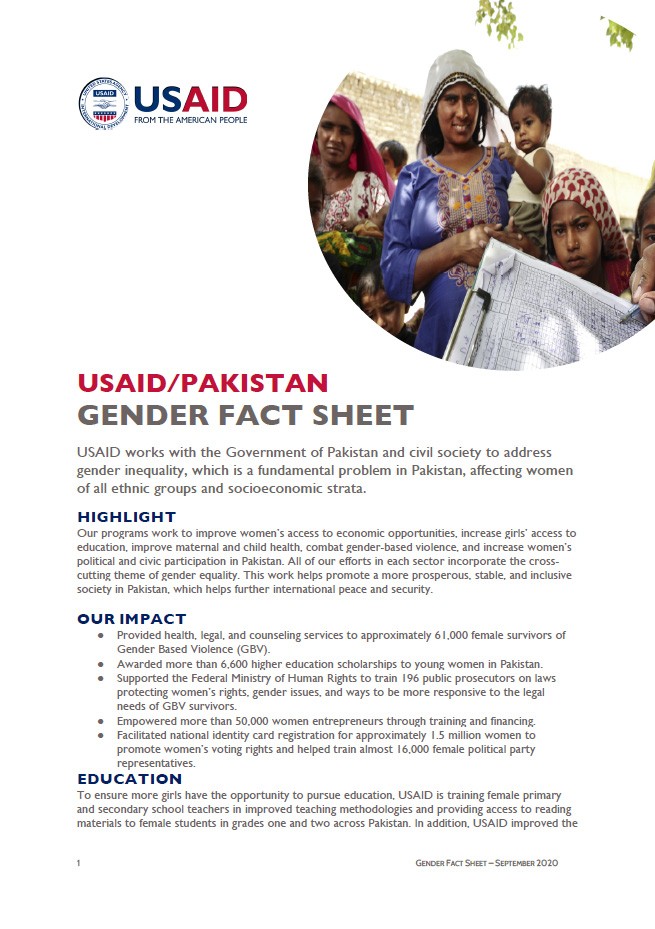Speeches Shim
The United States Agency for International Development (USAID) works with the Government of Pakistan and development partners to address gender inequality, which affects women of all ethnic groups and socio-economic strata.
HIGHLIGHT
Our programs work to improve women’s access to economic opportunities, increase girls’ access to education, improve maternal and child health, combat gender-based violence, and increase women’s political and civic participation in Pakistan. All of our efforts across sectors incorporate the cross-cutting theme of gender equality. This work helps promote a more prosperous, stable, and inclusive society in Pakistan, which helps further international peace and security.
OUR IMPACT
- Provided health, legal, and counseling services to approximately 61,000 female survivors of Gender Based Violence (GBV).
- Awarded more than 6,600 higher education scholarships to young women in Pakistan.
- Supported the Federal Ministry of Human Rights to train 196 public prosecutors on laws protecting women’s rights, gender issues, and legal protections for GBV survivors.
- Trained and financed more than 50,000 women entrepreneurs.
- Facilitated national identity card registration for approximately 1.5 million women to promote women’s voting rights.
- Helped train almost 16,000 female political party representatives.
EDUCATION
To ensure more girls have the opportunity to pursue education, USAID partnered with the Sindh government to improve the learning environment for female students in Sindh public schools and rehabilitated girls’ primary schools in the Newly Merged Districts. Additionally, USAID partnered with the Government of Pakistan to train female primary and secondary school teachers on improved teaching methodologies and provide access to reading materials to female students in grades one and two across Pakistan.
HEALTH
USAID has partnered with the government to improve maternal and child health in Pakistan. Since 2012, USAID-supported interventions have helped nearly 11 million women and children receive quality maternal, child, and reproductive health care services. USAID has also trained Lady Health Workers to provide basic health services to women in Khyber Pakhtunkhwa (KP) province through a mobile health unit program.
WOMEN IN AGRICULTURE
One way USAID helps boost Pakistan’s agricultural sector is by increasing productivity and business opportunities for women. USAID trained over 35,000 women in livestock management and horticulture, helping to create full-time equivalent jobs for women in agriculture and agribusinesses, and supporting women applying new technologies and best management practices in their businesses. As a result, over 30,000 women farmers have applied new technologies and management practices that helped them increase yields and productivity.
SUPPORTING WOMEN IN THE ENERGY SECTOR
USAID helped place female university graduates in public and private sector organizations that offered them on-the-job experience and opportunities for advancement in a traditionally male-dominated field. Some of these young graduates secured full-time jobs in these organizations, including in power plants, which makes them the first women to ever work there.
WOMEN AND ENTREPRENEURSHIP
Women’s economic empowerment is central to realizing women’s rights and gender equality. When more women work, economies grow. In collaboration with Women Chambers of Commerce and Industries across Punjab, Sindh, Balochistan, and KP, as well as with the Ministry of Industries & Production’s Small and Medium Enterprise Development Authority, USAID supports women-led businesses with business development services, training, and grants.
WOMEN IN TRADE POLICY
USAID has conducted nationwide training sessions for women on trade policy formulation in Pakistan, including: the role of trade bodies; the role of women in trade policy formulation and advocacy; and the impact of trade policy on businesses. These trainings enhance women business owners’ and entrepreneurs’ understanding of trade laws and policies and help develop a community of women with the potential for effective participation in general trade policy dialogue.
News
Gender Equality Fact Sheet [PDF, 562K]



Comment
Make a general inquiry or suggest an improvement.